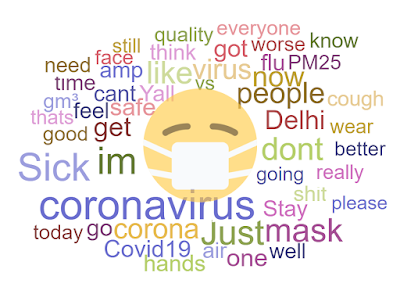We’re finally beginning to look past the virus. Some expect “things” will eventually be back to normal but I’m not one of them, not after what we’ve been through. It’s been unprecedented. The world and the United States have been through many epidemics but this one will have changed us the most by far. Why? It’s not the virus itself so much as the response to it and foremost is damage our response has inflicted on our economy. Ultimately that may kill more people than the virus does.
 |
| Do whatever he tells you. What can go wrong? |
Americans are ambivalent. The “We’re all in this together” feeling has been nice. We all pulled together to defeat a common enemy much as we did in World War II, but that’s changing. We’re trying to get to herd immunity and that’s a good thing too, but if we also get herd mentality that’s not, and we're seeing two herd mentalities divided along political lines. The blue herd believes we need to be guided by government and the red herd believes we need to think and act for ourselves.
 |
Last month our very-blue Governor Janet Mills closed Maine’s golf courses and beaches because that’s what they did in Massachusetts and those people might come here. Today she said her shutdown will continue through May for most things. Restaurants must stay closed until June — hotels and campgrounds until July. She won’t open northern Maine counties with few if any cases though federal guidelines would allow that.
 |
| Governor Janet Mills telling us what to do last Tuesday |
Maine mirrors the nation with an urban/rural political divide both politically and virally. Our two southern counties of York and Cumberland contain nearly half the population but almost all virus cases. Southern Maine is overwhelmingly leftist. Rural northern Maine is largely conservative. A rhetorical question someone asked me: If Montana had half of all the Covid 19 deaths, would we shut down New York City? Similarly, if Maine’s rural Aroostook County had 95% of Maine’s virus deaths, would Governor Mills shut down Portland?
Virus response was handled from Washington at first. President Trump listened to his medical advisors — not soon enough for his chronic critics — but he eventually followed their recommendations. The USA did what most other countries did: we shut down. Then we learned the models used by those medical advisors were faulty. Only then did authority devolve to the governors. Now governors are taking different courses and that’s good, but it begs the question: should we be allowing the decision-making process to take place at an even lower level?
As I mentioned in a last week’s column, that’s what Sweden has done. Ordinary Swedes make their own decisions about how to react, and it appears to be working. According to NPR, Sweden’s Ambassador to the USA recently announced: “We could reach herd immunity in the capital as early as next month.” That’s the goal, right? We cannot rely on getting a vaccine. That will take over a year at best and there’s little likelihood our economy would survive that long a ahutdown.
 |
| Doctor Murphy |
Writing Monday in the New York Post, Covid-positive, Bronx ER Doctor Daniel Murphy advises: “I’ve worked the coronavirus front line — and I say it’s time to start opening up.” He was swamped with Covid-19 patients early on, and then noticed the virus peaked at 1:00 pm on April 7th when “the number of arriving COVID-19 patients dropped below the number discharged, transferred or deceased.” He was that specific.
“This was striking,” he continued, “because the community I serve is poor. Some are homeless. Most work in ‘essential,’ low-paying jobs, where distancing isn’t easy. Nevertheless, the wave passed over us, peaked and subsided. The way this transpired tells me the ebb and flow had more to do with the natural course of the outbreak than it did with the lockdown.” This scenario supports the Israeli mathematician I mentioned in last week’s column who said the virus goes through an 8-week cycle regardless of whether there’s a shutdown or not.
 |
| Israeli Mathematician Yitzhak Ben-Israel |
Our president, governors, and mayors may discover very soon that they’re not in charge of what people do. A tailor in NYC today defied orders and reopened his shop. Nearby businesses admire his courage and declared they will open too. After Governor Mills announcements today, Maine businesses may follow suit. That would be very American. Early in this process we all took counsel from our fears, which many Americans historically warned against including Andrew Jackson, Stonewall Jackson, and George Patton. Let’s remember that as we restart our economy.



































